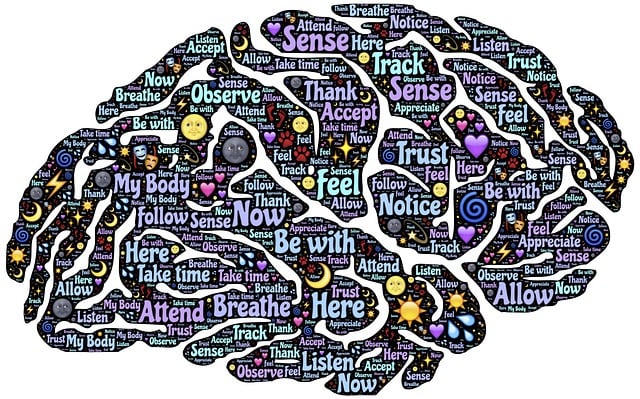Mental health data analysis relies on diverse sources, from online therapy platforms providing trends on young adult therapy-seekers to traditional clinic and school settings. These data are vital for shaping mental health policies and improving access to care. Online therapy has revolutionized support for young adults by offering accessible, anonymous sessions from home, addressing barriers to traditional care and encouraging open dialogue about mental health. Platforms utilize evidence-based practices and advanced analytics like regression analysis to personalize treatment. This approach, integrated with risk management planning, enables data-driven community outreach and tailored interventions based on emotional healing trends. However, balancing ethical considerations and privacy is paramount in this digital landscape to protect sensitive patient information while realizing the benefits of data-driven mental health care for young adults.
Mental health data analysis is a powerful tool for understanding and improving well-being, especially among young adults. This article explores the intricacies of analyzing and interpreting mental health data, focusing on online therapy’s growing role in this demographic. We discuss various data collection sources, from digital platforms to research studies, and delve into advanced analysis techniques. By examining trends and patterns within big data, we can identify effective interventions for young adults seeking therapy online, while also addressing critical ethical considerations surrounding privacy and data security.
- Understanding Mental Health Data: Collection and Sources
- The Role of Online Therapy in Young Adult Populations
- Data Analysis Techniques for Effective Interpretation
- Identifying Trends and Patterns: Insights from Big Data
- Ethical Considerations and Privacy in Mental Health Analytics
Understanding Mental Health Data: Collection and Sources

Understanding Mental Health Data involves recognizing that it’s a multifaceted landscape encompassing various sources and collection methods. Online therapy platforms, for instance, have emerged as significant contributors, providing rich data on trends among young adults seeking therapy. These digital tools offer accessible and often anonymous avenues for individuals to monitor their mental health progress over time, contributing valuable insights into common challenges like depression prevention and burnout prevention.
In addition to online therapy, traditional settings such as clinics, hospitals, and schools also gather vital mental health data through assessments, surveys, and medical records. Mental health policy analysis and advocacy play a crucial role in interpreting these data points, shaping public awareness, and influencing legislation related to mental healthcare access, particularly for young adults.
The Role of Online Therapy in Young Adult Populations

Online therapy has emerged as a significant development in mental health care, particularly for young adult populations. With the increasing digital connectivity, this form of therapy offers accessible and convenient support to individuals who might face barriers in attending traditional in-person sessions. Young adults, often navigating life transitions and unique challenges, can now access professional help from the comfort of their homes. This shift is especially beneficial for those facing issues like anxiety, depression, or trauma, as it provides a safe space to discuss personal struggles without the potential stigma associated with face-to-face therapy.
The integration of online therapy has also contributed to heightened public awareness campaigns and improved access to trauma support services. Many platforms now specialize in mood management, utilizing evidence-based practices and digital tools tailored to young adults’ needs. This innovative approach not only encourages a more open dialogue about mental health but also enables individuals to take an active role in their healing journey. As the field continues to evolve, ongoing research will further refine these online interventions, ensuring they remain effective and cater to the diverse emotional landscapes of young adults.
Data Analysis Techniques for Effective Interpretation

In the realm of mental health data analysis, various techniques are employed to interpret and gain valuable insights from collected information. For young adults seeking therapy, online platforms offer accessible solutions, providing a robust foundation for comprehensive data analysis. These digital tools facilitate the collection of quantitative and qualitative data, enabling mental health professionals to assess trends, identify patterns, and measure treatment outcomes effectively. By employing advanced statistical methods, such as regression analysis and machine learning algorithms, therapists can uncover correlations between therapeutic interventions and client improvements. This allows for personalized treatment plans tailored to individual needs, enhancing the overall effectiveness of online therapy sessions.
Integrating risk management planning is crucial within this process, especially considering the sensitive nature of mental health data. Mind Over Matter principles, emphasizing cognitive strategies and resilience-building, can be incorporated into analysis frameworks. Additionally, community outreach program implementation may involve data-driven decisions to expand access to mental health services, ensuring a holistic approach that addresses both individual client needs and broader community wellness.
Identifying Trends and Patterns: Insights from Big Data

In today’s digital age, the vast amounts of data generated from online therapy platforms offer a unique opportunity to identify trends and patterns in mental health issues among young adults. By leveraging advanced analytics techniques, researchers and professionals can gain valuable insights into the emotional healing processes of this demographic. This data-driven approach enables a deeper understanding of emerging challenges, such as increased stress levels or specific trauma support services needed by young adults.
For instance, analyzing large datasets from online therapy sessions could reveal correlations between digital engagement in therapy and improved confidence boosting among patients. Such findings could inform the development of more effective interventions tailored to the unique needs of young adults seeking mental health support. This data-informed perspective has the potential to revolutionize therapeutic practices, ensuring that services are accessible, efficient, and targeted towards fostering emotional well-being.
Ethical Considerations and Privacy in Mental Health Analytics

In the realm of mental health data analysis, ethical considerations and privacy are paramount, especially when exploring online therapy and its associated analytics. As digital platforms become more integrated into healthcare, ensuring the confidentiality and security of sensitive patient information is crucial. The collection, storage, and interpretation of mental health data must adhere to strict guidelines to protect individuals’ privacy, particularly young adults seeking therapy through online channels. This involves implementing robust encryption protocols, anonymization techniques, and access controls to safeguard personal details from unauthorized access or misuse.
The development of mental wellness coaching programs and community outreach initiatives can benefit from these analytics while respecting patient boundaries. For instance, data analysis might identify trends in youth mental health issues, guiding the creation of targeted interventions. Similarly, burnout prevention strategies for healthcare providers could be informed by analyzing large datasets, ensuring support systems are in place without compromising patient privacy. Balancing the potential benefits of data-driven insights with the ethical obligations to protect individuals’ mental health information is essential in navigating this evolving landscape, especially in the context of accessible online therapy services.
Mental health data analysis is a powerful tool to understand trends and improve services, especially for young adults seeking online therapy. By utilizing various data collection methods and advanced analysis techniques, we can gain valuable insights into the effectiveness of therapy for young adults. However, as we navigate this evolving landscape, it’s crucial to address ethical concerns regarding privacy and ensure responsible handling of sensitive information. Balancing these factors will enable us to create a more accessible and effective mental health support system tailored to the unique needs of today’s young adults.












